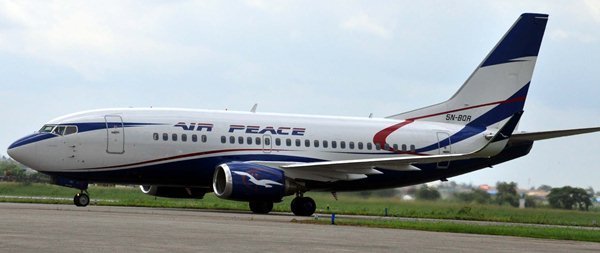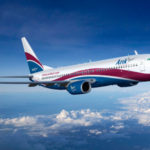
Domestic airlines have accused some African countries of strategically blocking them from flying to their countries while their airlines take advantage of the Single African Air Transport Market (SAATM) to operate into Nigeria.
Executive Chairman, Airline Operators of Nigeria (AON), Captain Nogie Meggison said that every African country targets the high passenger traffic in Nigeria while at the same time protecting their airlines and using stringent policies to block Nigerian carriers from operating to their own countries despite the open sky policy for Africa.
Speaking in the same the Chairman and CEO of Air Peace, Allen Onyema said that airline operators opposed the signing of the treaty by the Nigerian government because they knew that it would be detrimental to the nation’s airlines as other African states would not be willing to operate uniform charges for all regional carriers.
Onyema said unfortunately Nigeria does not adopt the principle of reciprocity by also introducing outrageous charges to discourage airlines from these countries to Nigeria.
“Rather, the federal government through its aviation agencies operates liberalised bilateral policies that make some African airlines to fly to many airports in the country without any Nigerian carrier flying to theirs,” he said.
“Some people make it seem as if SAATM is the best thing that has happened to this country. This is a lie. The truth is that the other countries in Africa are the ones gaining from SAATM; not necessarily Nigerian airlines. The population of most countries is relatively small; Nigeria is a country of almost 200 million people. Some of these countries are about five million people or less with very tiny air passenger traffic. It is not only that Nigeria has the largest population in Africa but also the highest travelling public.
“So when SAATM was introduced Nigeria embraced it without looking at its implications for its own airlines. They said if Nigeria does not sign the treaty her airlines would not be travelling to other African countries but that is not true because with bilateral air service agreement we can fly to any country in the continent,” Onyema added.
The Air Peace boss observed that some African airlines want to be coming to Nigeria and if possible operate domestic service in the country by taking advantage of SAATM to reap from Nigeria’s high passenger traffic.
“So in practice SAATM works for these other airlines but not for Nigerian airlines because they want to airlift passengers from Nigeria. But these countries don’t want us to come to their own countries and airlift passengers from there and they are being protected by their government which introduces stringent measures to stop Nigerian airlines from flying to those countries. But I support the position of their government. This is because they are supporting their airlines.
“If you want to protect Nigerian airlines, government should play the aero politics on our behalf. Senegal for two and half years has not responded to our letters requesting to fly to that country, even for once. They refused to attend to us because they are trying to float their own airline. So they are trying to protect what they will still do in future. Cote d’Ivoire did not want to allow us to fly to their country and we threatened to go to court so they allowed us but slammed us with high charges that are almost $10, 000 for one landing. This forced us to abandon that destination,” Onyema said.
He said that Nigerian government should take job creation seriously and therefore encourage businesses enterprises that are providing jobs in Nigeria, adding that if Nigerian airlines are given the support they need from government they would employ more Nigerians
He said: “If a lot of people are employed, insurgency will stop. Every country should take the issue of empowerment very seriously. No country toys with businesses that will create jobs. So government should play the aero politics and protect its own airlines like other countries in Africa are doing. If Nigerian airlines proper they will create more jobs for the country’s teeming youths.”
Expert: Investments in Port, Logistics Infrastructure Will Boost Africa’s GDP
Eromosele Abiodun
The rapid expansion of regional and international trade underscores the need for significant investments in port and logistics infrastructure as gateways for African exports, Chief Executive of Maritime and Port Authority of Singapore, Mr. Andrew Tan has said.
Tan stated this while addressing delegates and stakeholders at the just concluded African Maritime Administrations (AAMA) Conference held in Sharm El Sheikh, Egypt.
This, he stated, is crucial because exports would continue to be an important engine of growth for Africa, where every dollar exported is expected to increase gross domestic products (GDP) by $3.5 dollars.
Having adequate and efficient port infrastructure, he added, is therefore an important enabler to unlock economic growth and strengthen Africa’s competitiveness in the long run.
According to him, “Africa has been on a sustained growth path since the 1980s and holds tremendous economic potential today. Despite global volatility and uncertainties ahead, Africa’s growth outlook remains robust. Collective GDP in Africa is currently expanding faster than the world average. In particular, Sub-Saharan Africa is projected to continue accelerating to reach an average annual growth rate of 3.9 per cent by 20221. At this pace, Sub-Saharan Africa is on track to become the world’s second-fastest growing region after Emerging Asia.
“Africa has many diverse regional economies. Each offers unique strengths and opportunities. Through my engagements with African maritime officials and global business leaders, I have had the privilege to learn about the economic dynamism and transformations taking place across Africa.”
“Today, many African nations are seeking to diversify their economies beyond commodity-focused industries. At the enterprise level, African businesses are evolving rapidly by embracing technology and innovation. The pace and scope of change is impressive.
“For example, a recent report by McKinsey has recognised East Africa as a global leader in e-payments2. Digital trade is also fast expanding. In Nigeria, Africa’s largest economy, e-commerce revenue has doubled each year since 2010. Other industries such as manufacturing, financial services and IT services are growing rapidly as well, ‘he stated.
Regional integration, he pointed out, is another key driving force creating economic opportunities across multiple dimensions.
“The combination of significant infrastructure investments and a growing network of transport links has vastly improved physical connectivity and logistics efficiency in Africa. Efficiencies in logistics are important for large geographical regions like Africa – so landlocked countries, transhipment points, and port cities all share the benefits of trade and economic growth.
“External initiatives such as the Belt and Road Initiative will also drive the momentum for infrastructure development forward. Africa’s economic outlook today is bright. With large reserves of untapped resources and significant export potential, Africa will continue to play a significant role in the global trade and commodity value chain,” he said.
 Much like it is for Singapore, he said maritime connectivity will be a key enabler to sustain Africa’s growth momentum.
Much like it is for Singapore, he said maritime connectivity will be a key enabler to sustain Africa’s growth momentum.
“Infrastructure investments must therefore continue apace but with long-term planning considerations and greater emphasis on sustainability. Relevant stakeholders should coordinate on key issues such as logistics connectivity, cross-sector synergies and environmental impact as part of integrated infrastructure planning. We must also be prepared to adapt and transform the way we work by harnessing technology as a force multiplier. Investments in automation and digital tools are no longer good-to-haves but a necessity. This should be coupled with efforts to streamline workflows and optimise existing resources.
“Going forward, the global maritime industry will become more interconnected. Singapore and Africa today have a broad range of partnerships spanning trade, investments, capability exchange and maritime security among others. I am confident that we will further deepen our partnerships through multi-lateral platforms such as the International Maritime Organisation (IMO) and collaboration in new opportunities and growth areas, “he said.
Similarly, Tan said economic integration has made good progress, adding that the recent signing of the Continental Free Trade Agreement (CFTA) was a significant milestone.
“Regional blocs that are part of the African Economic Community are also cooperating more closely to reduce trade and economic barriers. These integration efforts will ensure that cross-border trade can continue to flourish. It will also enhance the non-physical flows of information, capital and talent throughout the region,” he added.
THISDAY






